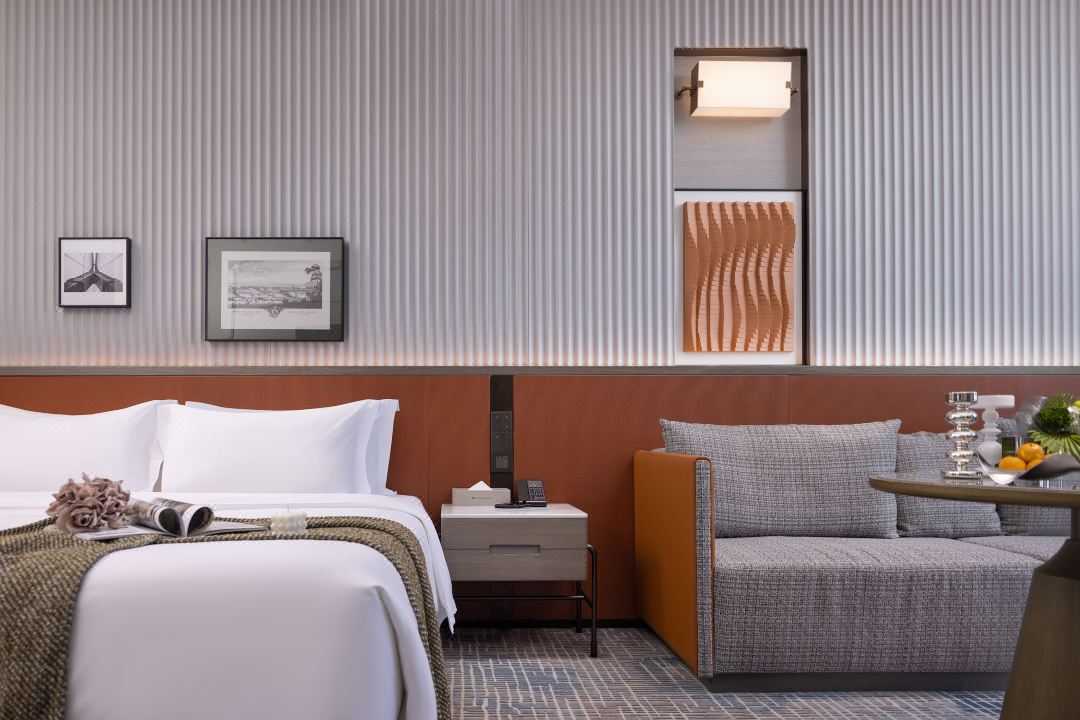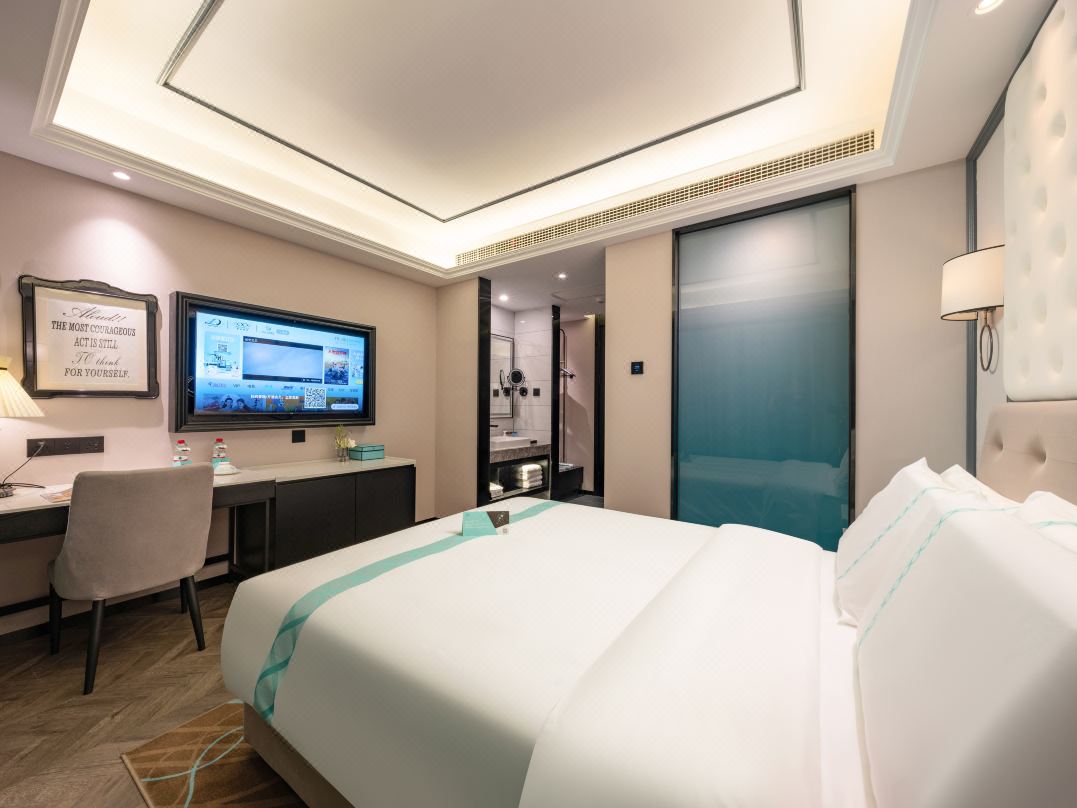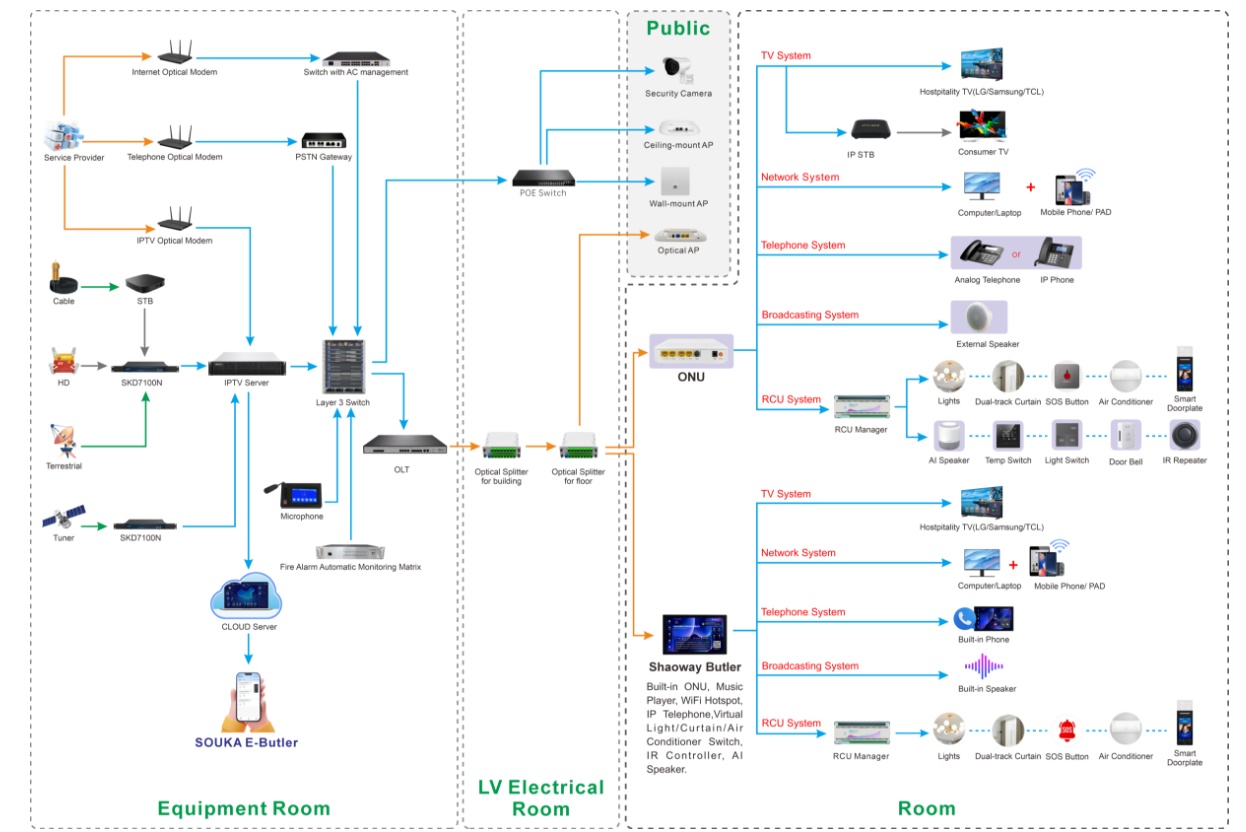اللاسلكي مقابل السلكي: دليل اتخاذ القرار بشأن أنظمة التحكم الذكية في غرف الضيوف في الفنادق

في ظلّ موجة بناء الفنادق الذكية، أصبحت أنظمة التحكم الذكي بالضيوف معيارًا لتعزيز التنافسية. وعند مفترق الطرق التكنولوجي، يواجه خبراء الفنادق سؤالًا حاسمًا: كيف يُفضّل المرء بين أنظمة التحكم الذكي بالضيوف اللاسلكية والسلكية؟ في الواقع، يُمثّل هذا التنافس بين التقنيات اللاسلكية والسلكية دراسةً شاملةً لأبعاد متعددة: سهولة التركيب، واستقرار النظام، وتكلفة الاستثمار، وغيرها.
من منظور التركيب والنشر، تتميز أنظمة التحكم الذكي اللاسلكية للضيوف براحة لا مثيل لها. فهي تتحرر من قيود الأسلاك التقليدية، مما يُلغي الحاجة إلى تمديدات كهربائية مُدمجة مسبقًا خلال مرحلة الديكور، مما يجعل عملية البناء بسيطة ومرنة. وتُظهر الأنظمة اللاسلكية مزايا أكبر عند تحديث الفنادق القائمة لأنظمة الذكاء الاصطناعي. على سبيل المثال، اختار فندق أعمال عريق حلاً لاسلكيًا لتحديث نظام التحكم الذكي للضيوف، وأكمل تركيب جميع غرف الضيوف وتصحيح أخطائها في أسبوع واحد فقط، مع تأثير ضئيل على العمليات الاعتيادية. في المقابل، يُمكن اعتبار تركيب نظام سلكي "مشروعًا ضخمًا". فهو يتطلب تخطيط مسارات الكابلات في مرحلة مبكرة من مرحلة ديكور الفندق، بما في ذلك عمليات مثل نحت الجدران ومد الأنابيب. هذا لا يؤدي فقط إلى دورة بناء طويلة، بل قد يُشكل أيضًا تحديات للتعديلات المستقبلية إذا كان تصميم الكابل الأولي غير مُناسب. بمجرد حدوث تلف في الكابل، تُصبح عمليات استكشاف الأخطاء وإصلاحها مُعقدة، وقد تتطلب إتلاف الجدران والأرضيات والتشطيبات الأخرى، مما يؤدي إلى تكاليف إضافية وإضاعة الوقت.

يُعدّ الاستقرار معيارًا أساسيًا لتقييم جودة نظام ذكي للتحكم بالضيوف. تُوفّر الأنظمة السلكية، بفضل توصيلاتها المادية، نقلًا مستقرًا وموثوقًا للبيانات، مع حماية عالية من تداخل الإشارات الخارجية، مما يضمن التشغيل المستقر لمختلف الأجهزة في غرف الفنادق. في الفنادق الفاخرة أو تلك المستخدمة في حفلات الاستقبال الحكومية، حيث يكون استقرار النظام بالغ الأهمية، تُفضّل أنظمة التحكم السلكية بالضيوف. على سبيل المثال، حافظت دار ضيافة حكومية تستخدم نظامًا سلكيًا ذكيًا للتحكم بالضيوف على مستوى الدولة على عدم حدوث أي أعطال أثناء مهام الاستقبال المهمة، مما يوفر للضيوف تجربة ذكية مستقرة وسلسة. مع ذلك، يعتمد استقرار الأنظمة اللاسلكية إلى حد ما على بيئة الشبكة. في المناطق التي تشهد تداخلًا شديدًا في الإشارة، مثل المناطق التجارية المزدحمة بالعديد من الأجهزة اللاسلكية، أو في الفنادق ذات الهياكل المعقدة التي تُسبب ضعف الإشارة، قد تواجه الأنظمة اللاسلكية مشاكل مثل انقطاع الإشارة أو تأخيرها، مما يؤثر على التشغيل العادي للأجهزة. مع ذلك، ومع تطور تقنية إنترنت الأشياء، أظهرت تقنيات الجيل الجديد اللاسلكية مثل زيجبي ولورا تحسينات كبيرة في القدرة على مقاومة التداخل والاستقرار، مما يُلبي الاحتياجات اليومية لمعظم الفنادق.
يُعدّ الاستثمار في التكلفة عاملاً حاسماً لا يُمكن لصانعي القرار في الفنادق إغفاله. تنطوي أنظمة التحكم الذكي بالضيوف السلكية على تكاليف بناء أولية أعلى. بالإضافة إلى شراء المعدات، هناك نفقات كبيرة لتركيب الأسلاك وصيانة الخطوط في المراحل اللاحقة. من ناحية أخرى، تُوفّر الأنظمة اللاسلكية عملية الأسلاك المعقدة، مما يُخفّض تكاليف التركيب بشكل كبير، مما يجعلها مناسبة بشكل خاص للفنادق الصغيرة والمتوسطة ذات الميزانيات المحدودة. مع ذلك، على المدى الطويل، قد تتطلب الأنظمة اللاسلكية استبدالات دورية للبطاريات وتحديثات للأجهزة، مما يُؤدي إلى بعض الشكوك في تكاليف صيانتها. بمجرد تركيب الأسلاك في النظام السلكي، وطالما لم تحدث أعطال كبيرة في الخطوط، تكون تكاليف الصيانة اللاحقة أقل نسبيًا وأكثر قابلية للتنبؤ.

تختلف أولويات الفنادق المختلفة عند اختيار نظام مراقبة النزلاء. بالنسبة للفنادق الفاخرة التي تسعى إلى تقديم خدمة فائقة الجودة، فإن استقرار وموثوقية الأنظمة السلكية يُلبيان متطلبات الجودة بشكل أفضل. أما بالنسبة للفنادق ذات السلسلة والفنادق الاقتصادية، فإن سهولة تركيب الأنظمة اللاسلكية وإمكانية التحكم في تكلفتها تجعلها خيارًا أكثر فعالية من حيث التكلفة. أما بالنسبة للفنادق المميزة ذات القيمة التاريخية والثقافية، فإن ميزة الأنظمة اللاسلكية - التي لا تتطلب إتلاف هيكل المبنى الأصلي - تتيح إجراء ترقيات ذكية مع الحفاظ على السمات الأصلية للمبنى إلى أقصى حد.
سواءً كانت أنظمة التحكم الذكي بالضيوف لاسلكية أو سلكية، لكلٍّ منها مزاياه الفريدة وتطبيقاته المناسبة. عند اختيار نظام، ينبغي على الفنادق دراسة موقعها، وحالة التجديد، وميزانيتها، ومتطلبات استقرار النظام بعناية. في عالم اليوم الذي يشهد تقدمًا تكنولوجيًا متواصلًا، يُمكن لاستكشاف حلول هجينة تجمع بين الاثنين، مستفيدةً من نقاط قوتها، أن يخلق بيئات معيشة أكثر ذكاءً وراحةً للضيوف، مما يُساعد الفنادق على التفوق في المنافسة الشرسة في السوق.


